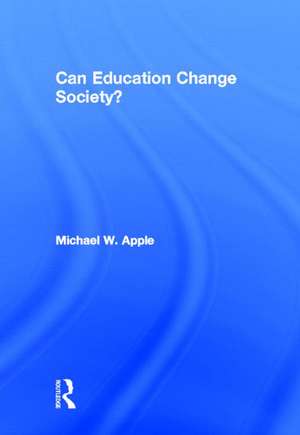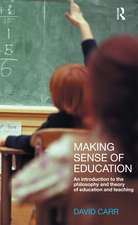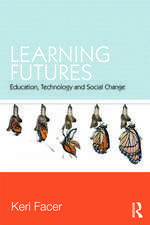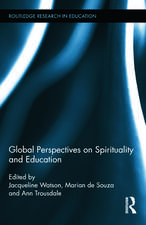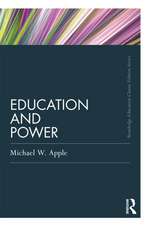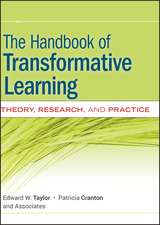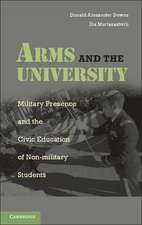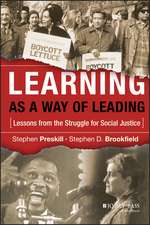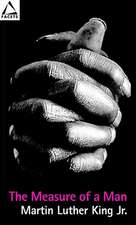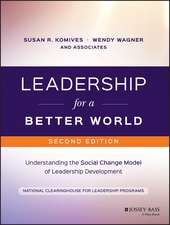Can Education Change Society?
Autor Michael W. Appleen Limba Engleză Hardback – 23 oct 2012
In this groundbreaking work, Apple pushes educators toward a more substantial understanding of what schools do and what we can do to challenge the relations of dominance and subordination in the larger society. This touchstone volume is both provocative and honest about the ideological and economic conditions that groups in society are facing and is certain to become another classic in the canon of Apple’s work and the literature on education more generally.
| Toate formatele și edițiile | Preț | Express |
|---|---|---|
| Paperback (1) | 372.59 lei 6-8 săpt. | |
| Taylor & Francis – 23 oct 2012 | 372.59 lei 6-8 săpt. | |
| Hardback (1) | 999.64 lei 6-8 săpt. | |
| Taylor & Francis – 23 oct 2012 | 999.64 lei 6-8 săpt. |
Preț: 999.64 lei
Preț vechi: 1219.08 lei
-18% Nou
Puncte Express: 1499
Preț estimativ în valută:
191.30€ • 207.73$ • 160.70£
191.30€ • 207.73$ • 160.70£
Carte tipărită la comandă
Livrare economică 23 aprilie-07 mai
Preluare comenzi: 021 569.72.76
Specificații
ISBN-13: 9780415875325
ISBN-10: 0415875323
Pagini: 198
Dimensiuni: 152 x 229 x 13 mm
Greutate: 0.44 kg
Ediția:1
Editura: Taylor & Francis
Colecția Routledge
Locul publicării:Oxford, United Kingdom
ISBN-10: 0415875323
Pagini: 198
Dimensiuni: 152 x 229 x 13 mm
Greutate: 0.44 kg
Ediția:1
Editura: Taylor & Francis
Colecția Routledge
Locul publicării:Oxford, United Kingdom
Cuprins
Acknowledgements 1. Can Education Change Society? 2. Paulo Freire and the Tasks of the Critical Scholar/Activist in Education 3. George Counts and the Politics of Radical Change 4. Du Bois, Woodson, and the Politics of Transformation 5. Keeping Transformations Alive: Learning from the "South" (Luis Armando Gandin and Michael W. Apple) 6. Wal-Marting America: Social Change and Educational Action 7. Critical Education, Speaking the Truth, and Acting Back 8. Answering the Question: Education and Social Transformation Bibliography Index
Notă biografică
Michael W. Apple is John Bascom Professor of Curriculum and Instruction and Educational Policy Studies at the University of Wisconsin, Madison, USA.
Recenzii
"The strength of Apple's book is the combination of theoretical and empirical approaches, which he analyses from a personal and reflective perspective. He encourages us to think about our own actions as educators in how we respond to the questions, ‘can education change society?’….The great strength of this remarkable and ground breaking work is Michael Apple’s own overwhelming passion for justice, equality and his continuing fight to making a real contribution to changing society. It’s an enjoyable and engaging read that will appeal to education students, academics, practitioners and activists who are equally committed to making a more equitable and just society." - Kalwant Bhopal, University of Southampton, UK, Race, Ethnicity and Education
"Education can certainly change society, but as Apple shows, not necessarily in ways that critical and progressive educators might wish. He encourages us to take heed of the conservative modernisation efforts by the right through the alliance of neoliberal, neoconservative and populist religious movements to use education both as a site of, and a tool for, social transformation, in order to learn how to bring about counter-hegemonic efforts." - Stewart Riddle Faculty of Education, University of Southern Queensland, Australia, Discourse: Studies in the Cultural Politics of Education
"...these books (Can Education Change Society? and Knowledge, Power, and Education) together reminds us that all our individual and local counter-hegemonic efforts in our own colleges, departments, and home communities need to reach out to similar and more regional and national movements. It is the only through such efforts of counter-hegemonic extension that "decentered unities" are formed and Badiouian events occur. Although Badiouian events appear to happen suddenly and out of nowhere, in fact they typically follow years and decades (sometime centuries) of counter-hegemonic struggle.Apple's body of work, generally, and his most recent two books in particular, are a reminder and guide to the "realization of the importance of understanding the connections amoung intersecting power relations and working toward the long-term goals involved in building [what Williams called] 'the long revolution'" - Hans G Despain, Nichols College Massachusetts, Marx & Philosophy Review of Books
"For scholars and researchers in the field of comparative and international education, this current book adds to both the depth and breadth of our ongoing conversation with Apple’s scholarship. ... this book deserves to be both read and taught." -Comparative Education Review
"Education can certainly change society, but as Apple shows, not necessarily in ways that critical and progressive educators might wish. He encourages us to take heed of the conservative modernisation efforts by the right through the alliance of neoliberal, neoconservative and populist religious movements to use education both as a site of, and a tool for, social transformation, in order to learn how to bring about counter-hegemonic efforts." - Stewart Riddle Faculty of Education, University of Southern Queensland, Australia, Discourse: Studies in the Cultural Politics of Education
"...these books (Can Education Change Society? and Knowledge, Power, and Education) together reminds us that all our individual and local counter-hegemonic efforts in our own colleges, departments, and home communities need to reach out to similar and more regional and national movements. It is the only through such efforts of counter-hegemonic extension that "decentered unities" are formed and Badiouian events occur. Although Badiouian events appear to happen suddenly and out of nowhere, in fact they typically follow years and decades (sometime centuries) of counter-hegemonic struggle.Apple's body of work, generally, and his most recent two books in particular, are a reminder and guide to the "realization of the importance of understanding the connections amoung intersecting power relations and working toward the long-term goals involved in building [what Williams called] 'the long revolution'" - Hans G Despain, Nichols College Massachusetts, Marx & Philosophy Review of Books
"For scholars and researchers in the field of comparative and international education, this current book adds to both the depth and breadth of our ongoing conversation with Apple’s scholarship. ... this book deserves to be both read and taught." -Comparative Education Review
Descriere
In this groundbreaking work, Apple pushes educators toward a more substantial understanding of what schools do and what we can do to challenge the relations of dominance and subordination in the larger society.
